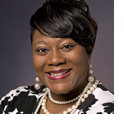
A Note from Ujima Donalson,
POD Director
As leaders, we’re likely to receive countless unexpected "gifts" that we can’t refuse or return and must accept as graciously as possible. It may be a key staff member announcing early retirement, a budget report that blows holes in our two-year plan, or some other change-initiating missive. My calling these "gifts" is only partly tongue-in-cheek. The truth is that every unexpected event provides opportunities for growth; the trick is remembering that when it feels like the ground is shifting beneath our feet.
As the saying goes, what doesn’t kill us makes us stronger. When we receive unwelcome news or are faced with adversity at work or at home, it tests our mettle. Nelson Mandela had his mettle tested more than most could withstand, and as pointed out in our feature article below, his capacity for self-reflection was crucial to his survival and success.
It strikes me that the losses we face may be the most unwelcome of gifts, but they may also provide the richest opportunities for growth. I was one of millions around the world who felt deeply saddened about Mandela’s passing, but I, along with the other members of POD who have worked on this issue of the Leading Edge, have been given the gift of reading about and reflecting upon his extraordinary life. Further, it prompted us to ask several leaders across UW what they believe makes a leader truly great, and I hope you will enjoy reading their responses as much as I have.
For me, two keys to Mandela’s brilliance as a leader were his passion and influence. He continually took on the responsibility to right social wrongs, and his belief in the possibility of a better world fueled his passion. Determination alone wouldn’t have been enough to shift an entire nation and culture; Mandela was aware of various influencing strategies and perfected them throughout his life. He didn’t rely solely on positional power; instead, he guided and directed people by using his charisma, building relationships, and modeling. He was the consummate example of walking the talk.
In January, many at the UW felt a loss much closer to home when UW Tacoma Chancellor Debra Friedman passed away. I did not know Chancellor Friedman personally, but from what I understand she left an incredible legacy of expanding UW Tacoma’s reach along with access to higher education. I wish everyone at UW Tacoma the strength to carry her work forward.
When faced with unwelcome news, a traumatic event, or an unexpected hardship, the last thing we’re likely to think about is how it will help us grow or make us stronger. However, how we deal with challenges shapes and defines our character, as humans and as leaders. If we give ourselves the time and space to reflect on our struggles and how we faced them, we can enrich our opportunities for self-discovery and personal growth.


